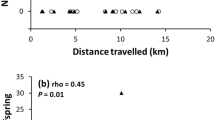Abstract
There is ample evidence that phenotypic traits are important mate choice criteria. Yet, we still know little about the importance of behavioural plasticity in attracting mates, although females could gain direct and/or indirect fitness benefits by choosing males that can adjust their behaviour to environmental fluctuations. Plasticity in foraging tactic use, particularly, might be a key determinant of fitness that could guide mate choice. In this study, we thus asked whether female zebra finches (Taeniopygia guttata) prefer males exhibiting greater plasticity in their foraging tactic use. We measured individual plasticity in a producer–scrounger game where males and females, playing in turn, were exposed to two seed distribution treatments, and females could monitor the males’ behaviour, unbeknownst to them. Subsequently, we measured the time each female spent in front of the males they had previously observed in the expectation that females would exhibit a general preference for males with greater plasticity in tactic use. Contrary to our expectation, we found that females did not unanimously prefer the males exhibiting greater plasticity but differed widely in their preference with more plastic females showing a stronger preference for male plasticity compared to the other females. Thus, our findings suggest that differences among females in their mating preference would contribute to maintaining differences in plasticity in tactic use.
Significance statement
Mate choice is a crucial decision in an individual’s life that directly impacts its fitness. Given that females could benefit from choosing males capable of responding to changes in environmental conditions, we asked in this study whether female zebra finches (Taeniopygia guttata) prefer males exhibiting greater plasticity in their foraging tactic use. We let females observe males expressing plasticity in a social foraging context and scored their mate preference for male plasticity. We found that females differed in their preference for male plasticity in tactic use, with more plastic females exhibiting a stronger preference for male plasticity compared to the others. Our results indicate that behavioural plasticity may be used as a mate choice criterion and hence suggest that mate choice might contribute to maintaining differences in male behavioural plasticity.





Similar content being viewed by others
Data availability
The datasets generated and/or analysed during the current study are available from the corresponding author on reasonable request.
References
Akaike H (1973) Information theory and an extension of the maximum likelihood principle. In: Petrov B, Csaki F (eds) Proceedings of the second international symposium on information theory. Budapest, Hungary, pp. 267–281
Andersson M (1994) Sexual selection. Princeton University Press, Princeton
Andersson M, Simmons LW (2006) Sexual selection and mate choice. Trends Ecol Evol 21:296–302. https://doi.org/10.1016/j.tree.2006.03.015
Ariyomo TO, Watt PJ (2013) Disassortative mating for boldness decreases reproductive success in the guppy. Behav Ecol 24:1320–1326. https://doi.org/10.1093/beheco/art070
Barou Dagues M, Hall CL, Giraldeau LA (2020) Individual differences in learning ability are linked to behavioral plasticity in a frequency-dependent game. Anim Behav 159:97–103. https://doi.org/10.1016/j.anbehav.2019.11.011
Bateson P (1983) Mate choice. Cambridge University Press, Cambridge
Beauchamps G, Giraldeau LA (1996) Group foraging revisited: information sharing or producer-scrounger game? Am Nat 148:738–743
Betini GS, Norris R (2012) The relationship between personality and plasticity in tree swallow aggression and the consequences for reproductive success and the consequences for reproductive success. Anim Behav 83:137–143. https://doi.org/10.1016/j.anbehav.2011.10.018
Boogert NJ, Bui C, Howarth K, Giraldeau LA, Lefebvre L (2010) Does foraging behaviour affect female mate preferences and pair formation in captive zebra finches? PLoS One 5:e14340. https://doi.org/10.1371/journal.pone.0014340
Bowers EK, Sakaluk SK, Thompson CF (2017) Interactive effects of parental age on offspring fitness and age-assortative mating in a wild bird. J Exp Zool A 327:302–310. https://doi.org/10.1002/jez.2090
Burley NT, Hamedani E, Symanski C (2018) Mate choice decision rules: trait synergisms and preference shifts. Ecol Evol 8:2380–2394. https://doi.org/10.1002/ece3.3831
Carballo M, Baldenegro F, Bollatti F, Peretti AV, Aisenberg A (2017) No pain, no gain: male plasticity in burrow digging according to female rejection in a sand-dwelling wolf spider. Behav Process 140:174–180. https://doi.org/10.1016/j.beproc.2017.05.007
Chantal V, Gibelli J, Dubois F (2016) Male foraging efficiency, but not male problem-solving performance, influences female mating preferences in zebra finches. PeerJ 4:e2409. https://doi.org/10.7717/peerj.2409
Dingemanse NJ, Wolf M (2013) Between-individual differences in behavioural plasticity within populations: causes and consequences. Anim Behav 85:1031–1039. https://doi.org/10.1016/j.anbehav.2012.12.032
Dingemanse NJ, Kazem AJN, Réale D, Wright J (2010) Behavioural reaction norms: animal personality meets individual plasticity. Trends Ecol Evol 25:81–89. https://doi.org/10.1016/j.tree.2009.07.013
Elie JE, Theunissen FE (2018) Zebra finches identify individuals using vocal signatures unique to each call type. Nat Commun 9:4026. https://doi.org/10.1038/s41467-018-06394-9
Fargevieille A, Grégoire A, Charmantier A, del Rey GM, Doutrelant C (2017) Assortative mating by colored ornaments in blue tits: space and time matter. Ecol Evol 7:2069–2078. https://doi.org/10.1002/ece3.2822
Fazhan H, Waiho K, Norfaizza WIW, Megat FH, Ikhwanuddin M (2017) Assortative mating by size in three species of mud crabs, genus Scylla De Haan, 1833 (Brachyura: Portunidae). J Crustacean Biol 37:654–660. https://doi.org/10.1093/jcbiol/rux063
Forstmeier W, Birkhead TR (2004) Repeatability of mate choice in the zebra finch: consistency within and between females. Anim Behav 68:1017–1028. https://doi.org/10.1016/j.anbehav.2004.02.007
Gibelli J, Aubin-Horth N, Dubois F (2018) Are some individuals generally more behaviorally plastic than others? An experiment with sailfin mollies. PeerJ 6:e5454. https://doi.org/10.7717/peerj.5454
Giraldeau LA, Hogan JA, Clinchy J (1990) The payoffs to producing and scrounging: what happens when patches are divisible? Ethology 85:132–146
Han CS, Brooks RC (2014) Long-term effect of social interactions on behavioral plasticity and lifetime mating success. Am Nat 183:431–444
Hofler CD (2007) Male mate choice and size-assortative pairing in a jumping spider, Phidippus clarus. Anim Behav 73:943–954. https://doi.org/10.1016/j.anbehav.2006.10.017
Jennions MD, Petrie M (1997) Variation in mate choice and mating preferences: a review of causes and consequences. Biol Rev 72:283–327. https://doi.org/10.1017/s0006323196005014
Kilgour RJ, McAdam AG, Betini GS, Norris DR (2018) Experimental evidence that density mediates negative frequency-dependent selection on aggression. J Anim Ecol 87:1091–1101. https://doi.org/10.1111/1365-2656.12813
Komer PE (1997) Behavioral plasticity in variable environments. Can J Zool 75:161–169. https://doi.org/10.1139/z97-023
Koops MA, Giraldeau LA (1996) Producer-scrounger foraging games in starlings: a test of rate-maximising and risk-sensitive models. Anim Behav 51:773–783. https://doi.org/10.1006/anbe.1996.0082
MacDougall AK, Montgomerie R (2003) Assortative mating by carotenoid-based plumage colour: a quality indicator in American goldfinches, Carduelis tristis. Naturwissenschaften 90:464–467. https://doi.org/10.1007/s00114-003-0459-7
Matos RJ, McGregor PK (2002) The effect of the sex of an audience on male-male displays in siamese fighting fish (Betta splendens). Behaviour 139:1211–1221. https://doi.org/10.1163/15685390260437344
Minter EJA, Watts PC, Lowe CD, Brockhurst MA (2015) Negative frequency-dependent selection is intensified at higher population densities in protist populations. Biol Lett 11:20150192. https://doi.org/10.1098/rsbl.2015.0192
Mitchell DJ, Biro PA (2017) Is behavioural plasticity consistent across different environmental gradients and through time? Proc R Soc B 284:20170893. https://doi.org/10.1098/rspb.2017.0893
Montiglio PO, Wey TW, Chang AT, Fogarty S, Sih A (2016) Multiple mating reveals complex patterns of assortative mating by personality and body size. J Anim Ecol 85:125–135. https://doi.org/10.1111/1365-2656.12436
Montiglio PO, Wey TW, Chang AT, Fogarty S, Sih A (2017) Correlational selection on personality and social plasticity: morphology and social context determine behavioural effects on mating success. J Anim Ecol 86:213–226. https://doi.org/10.1111/1365-2656.12610
Morand-Ferron J, Giraldeau LA (2010) Learning behaviorally stable solutions to producer–scrounger games. Behav Ecol 21:343–348. https://doi.org/10.1093/beheco/arp195
Morand-Ferron J, Varennes E, Giraldeau LA (2010) Individual differences in plasticity and sampling when playing behavioural games. Proc R Soc Lond B 278:1223–1230. https://doi.org/10.1098/rspb.2010.1769
Mottley K, Giraldeau LA (2000) Experimental evidence that group foragers can converge on predicted producer-scrounger equilibria. Anim Behav 60:341–350. https://doi.org/10.1006/anbe.2000.1474
Naguib M, Nemitz A (2007) Living with the past: nutritional stress in juvenile males has immediate effects on their plumage ornaments and on adult attractiveness in zebra finches. PLoS One 2:e901. https://doi.org/10.1371/journal.pone.0000901
Patricelli GL, Uy JAC, Walsh G, Borgia G (2002) Male displays adjusted to female’s response. Nature 415:279–280. https://doi.org/10.1038/415279a
Pinheiro J, Bates D (2000) Mixed effects models in S and S-Plus. Springer-Verlag, New York
Price DK, Burley NT (1994) Constraints on the evolution of attractive traits: selection in male and female zebra finches. Am Nat 144:908–934
Ritschard M, Brumm H (2012) Zebra finch song reflects current food availability. Evol Ecol 26:801–812. https://doi.org/10.1007/s10682-011-9541-3
Rowland WJ, Bolyard KJ, Jenkins JJ, Fowler J (1995) Video playback experiments on stickleback mate choice: female motivation and attentiveness to male colour cues. Anim Behav 49:1559–1567. https://doi.org/10.1016/0003-3472(95)90077-2
Schuett W, Godin J-GJ, Dall SRX (2011) Do female zebra finches, Taeniopygia guttata, choose their mates based on their ‘personality’? Ethology 117:908–917. https://doi.org/10.1111/j.1439-0310.2011.01945.x
Snowberg LK, Benkman CW (2009) Mate choice based on a key ecological performance trait. J Evol Biol 22:762–769. https://doi.org/10.1111/j.1420-9101.2009.01699.x
Stamps JA (2016) Individual differences in behavioural plasticities. Biol Rev 91:534–567. https://doi.org/10.1111/brv.12186
Stamps JA, Krishna VV (2014) Individual differences in the potential and realized developmental plasticity of personality traits. Front Ecol Evol 2:69. https://doi.org/10.3389/fevo.2014.00069
Stoffel MA, Nakagawa S, Schielzeth H (2017) rptR: repeatability estimation and variance decomposition by generalized linear mixed-effects models. Methods Ecol Evol 8:1639–1644. https://doi.org/10.1111/2041-210X.12797
Swaddle JP, Cuthill IC (1994) Female zebra finches prefer males with symmetric chest plumage. Proc R Soc Lond B 258:267–271
Tomaszycki MLT, Adkins-Regan EB (2005) Experimental alteration of male song quality and output affects female mate choice and pair bond formation in zebra finches. Anim Behav 70:785–794. https://doi.org/10.1016/j.anbehav.2005.01.010
Toscano BJ (2017) Prey behavioural reaction norms: response to threat predicts susceptibility to predation. Anim Behav 132:147–153. https://doi.org/10.1016/j.anbehav.2017.08.014
Ullrich R, Norton P, Scharff C (2016) Waltzing Taeniopygia: integration of courtship song and dance in the domesticated Australian zebra finch. Anim Behav 112:285–300. https://doi.org/10.1016/j.anbehav.2015.11.012
Vickery WL, Giraldeau L, Templeton JJ, Kramer DL, Chapman CA (1991) Producers, scroungers, and group foraging. Am Nat 137:847–863
Witte K (2006) Time spent with a male is a good indicator of mate preference in female zebra finches. Ethol Ecol Evol 18:195–204. https://doi.org/10.1080/08927014.2006.9522707
Zahavi A (1975) Mate selection-a selection for a handicap. J Theor Biol 53:205–214. https://doi.org/10.1016/0022-5193(75)90111-3
Zann RA (1996) The zebra finch: a synthesis of field and laboratory studies. Oxford University Press, Oxford
Acknowledgements
We thank Sandrine Bélanger and Lisandre Robichaud for courtship behaviour data collection, the two anonymous reviewers for their comments and all members of the Dubois laboratory for fruitful discussions.
Funding
This work was supported by a research grant awarded from Natural Sciences and Engineering Research Council of Canada discovery grant (grant number RN000480) to FD.
Author information
Authors and Affiliations
Corresponding author
Ethics declarations
Conflict of interest
The authors declare that they have no conflict of interest.
Ethical approval
All captures were done in the dark and the birds were gradually familiarized with all experiment devices and procedures. The experiments were conducted from 2017-06-05 to 2019-01-22 within the UdeM animal care facility. All procedures were in compliance with the guidelines of the Canadian Council for Animal Care and were approved by the committee of ethics on animal use of the University of Montreal (animal care permit #17-047).
Additional information
Communicated by A. Pilastro
Publisher’s note
Springer Nature remains neutral with regard to jurisdictional claims in published maps and institutional affiliations.
Electronic supplementary material
ESM 1
(DOCX 1663 kb)
Rights and permissions
About this article
Cite this article
Barou-Dagues, M., Richard-Dionne, É. & Dubois, F. Do female zebra finches prefer males exhibiting greater plasticity in foraging tactic use?. Behav Ecol Sociobiol 74, 107 (2020). https://doi.org/10.1007/s00265-020-02886-1
Received:
Revised:
Accepted:
Published:
DOI: https://doi.org/10.1007/s00265-020-02886-1




